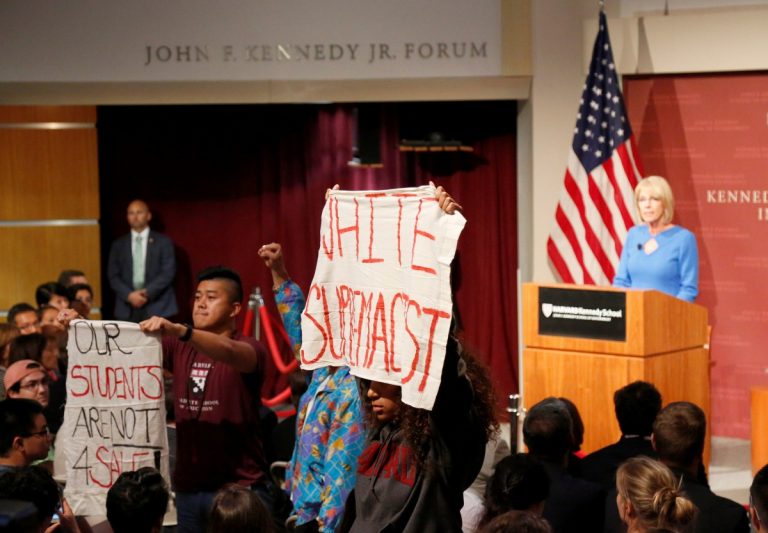
US Education Secretary Betsy DeVos sparked outrage by claiming that choosing an education institution is similar to choosing which food truck to use.
DeVos controversially presented education as a disposable commodity, much like a meal from a food van, at a conference about the future of school choice in the United States.
At the conference, held at Harvard University, she said: “Some [food trucks] are better than others, and some are even local restaurants that have added food trucks to their businesses to better meet customer’s needs.
“Now, if you visit one of those food trucks instead of a restaurant, do you hate restaurants? Or are you trying to put grocery stores out of business? No. You are simply making the right choice for you based on your individual needs at that time.
“Just as in how you eat, education is not a binary choice. Being for equal access and opportunity – being for choice – is not being against anything.”
DeVos at Harvard: School choice like choosing a food truck. "You are simply making the right choice for you based on your individual needs." pic.twitter.com/VG9DGZjUUE
— Edwin Rios (@Edwin_D_Rios) September 29, 2017
DeVos faced backlash for her comment; after all, education is a lot more important than simply choosing what to have at dinnertime.
Peter Greene, an English teacher in Pennsylvania, wrote on his blog: “DeVos chooses an analogy that paints education as a commercial transaction in which the customer buys some goods.
“There are many reasons that comparing schools to businesses is a huge fail, but this is one of the hugest – there is no business sector in this country built on the idea of serving every single person in the country.
“Each food truck operates on the idea that some people will eat there and other people won’t, and as long as enough people eat there, the food truck is good. But if there are people who don’t eat at any of the food trucks, some people who don’t eat at all – well, that is not the food truck operator’s problem.
“The modern charter industry is a business model, and just like any other business model, it is built on serving some customers. Making sure that every student in America gets a good education is not the goal, the purpose or even the concern of the charter industry. But it has to be the concern of a public school system.”
This is not the first time that DeVos has come under fire for her public school analogies.
“Just as the traditional taxi system revolted against ridesharing, so too does the education establishment feel threatened by the rise of school choice. In both cases, the entrenched status quo has resisted models that empower individuals,” she said in March.
“Nobody mandates that you take an Uber over a taxi, nor should they. But if you think ridesharing is the best option for you, the government shouldn’t get in your way.”
https://twitter.com/jmlarkin/status/913529330197778432
But Greene argues that he is not against changing the status quo; in fact, he is for it. Just not the change that the education secretary is advocating.
Change in the ways race and poverty are discussed in schools, change in the rhetoric surrounding the issue of failing public schools, and change in the ways teachers are treated, are more than welcomed.
Attendees of the conference reflected similar opinions toward the education secretary, as they held protest signs against ‘white supremacy’ and sexual assault on college campuses.
While DeVos was echoing the mentality of 21st Century US, which values freedom and autonomy, Greene summed up the objection to this approach with the statement: ”Schools are not businesses. Students are not customers. And education is not a side of fries.”
Liked this? Then you’ll love these…
College sexual assault policy scrapped by US Education Department
‘Stand for the flag – or don’t play’, US college tells its athletes







